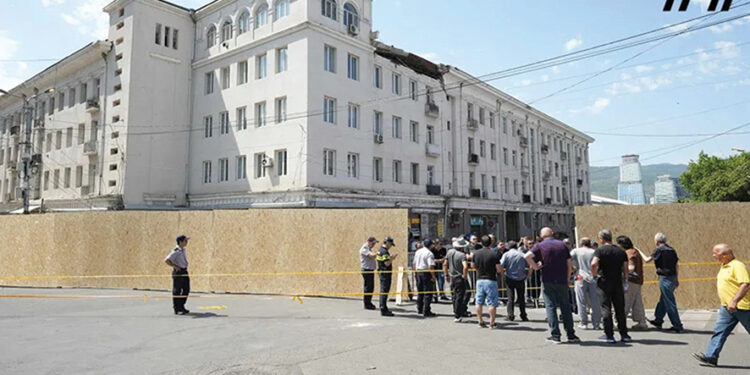Following the deadly collapse of a residential building on Tevdore Mghvdeli Street near Station Square, Tbilisi Mayor Kakha Kaladze addressed public outrage, rejecting claims of municipal negligence and emphasizing that residents had been offered alternatives under the city’s official housing replacement program.
“We’re not the kind of people who storm into families’ homes and drag them out,” Kaladze said. “We’re building a modern state where people can move from dangerous buildings into new apartments, backed by the municipality—not private investors.” He insisted City Hall had fulfilled its obligations, stating that only two residents of the collapsed building accepted the city’s offer and are currently receiving rent support.
Kaladze dismissed the backlash as politically motivated and stressed that structural problems must be addressed with honesty, not blame. “Governments and mayors will change, but these issues will persist unless tackled responsibly,” he said.
The July 14 collapse, which resulted in two deaths and a hospitalization, drew a strong response from Public Defender Levan Ioseliani, who extended condolences and criticized the ongoing failure to secure safe housing for thousands of Tbilisi residents. According to City Hall, more than 10,000 buildings in the capital are classified as unsafe—a figure unchanged since at least 2021.
Of these, only 2,337 are currently under municipal review. Progress has been slow: negotiations are ongoing with 43 condominiums, full agreements reached in 13 cases, and actual reconstruction started at just two sites. The sluggish pace is largely due to complex negotiations among residents, local authorities, and developers.
Buildings are rated on a five-level scale by experts from the Levan Samkharauli National Bureau of Forensic Expertise. Only those in categories III–V, indicating structural damage or imminent danger, are eligible for the city’s housing replacement program. Under this initiative, residents are offered new apartments equal in size to their current homes, and rent is covered during temporary relocation.
Following this week’s collapse, 102 residents were evacuated and temporarily housed in 11 hotels by the Didube District Administration. Residents were allowed to retrieve their belongings from the site under a firefighter-supervised schedule.
Ioseliani’s office is investigating whether residents’ rights to a safe living environment were upheld. “For years, citizens have appealed to us about hazardous housing,” his statement read. “These conditions endanger not only residents but everyone nearby. The issue demands urgent, effective, and systemic solutions—something current policies have yet to deliver.”
By Team GT














